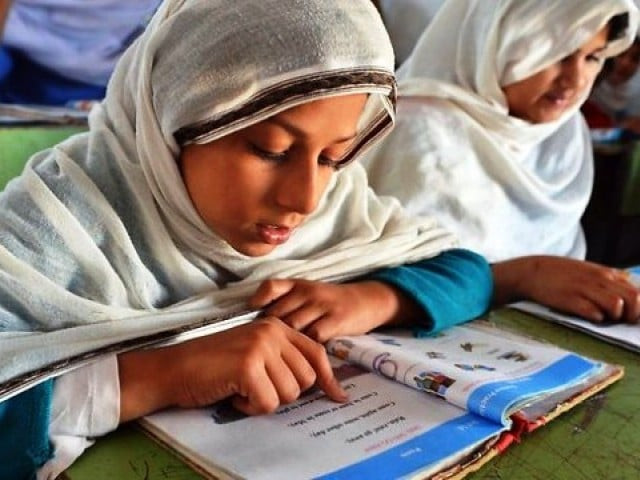Pakistan has 43% violence in schools: report
7 out of 10 children in Asia experience violence at school

PHOTO: AFP
The research, carried out across 2013 and 2014 assessed the prevalence, nature, response and reporting of various forms of school-related gender-based violence (SRGBV) in, around and on the way to school in five Asian countries, namely, Cambodia, Indonesia, Nepal, Pakistan and Vietnam.

PHOTO COURTESY: INTERNATIONAL CENTER FOR RESEARCH ON WOMEN
Despite Pakistan having the lowest levels of violence, an international group has said that 43% is still a "distressingly high" rate.
While conducting the research, ICRW spoke to over 9,000 boys and girls across the five countries about their experiences pertaining to violence and gender equality in schools. The findings from the research are detrimental for designing an effective programme that responds to the real needs, priorities and interests of school going boys and girls in these countries.
Read: Combating violence: Public school students learn ways to counter violence
The violence ranges from physical and sexual abuse, emotional violence, and threat of violence. Violence in schools is rife and is perpetrated by teachers, school staff, among students themselves, and from family members.
The report presented data collected from more than 9,000 girls and boys studying in grades six through eight, parents, teachers, NGO workers and other stakeholders in the five countries.
Released on Monday, the report reveals high levels of violence in schools across Asia, with seven out of 10 children reported to have experienced violence at school.
Students in Indonesia reported a shocking level of violence at 84% of which 43% students report doing nothing when they witnessed an incident of violence at school.

PHOTO COURTESY: INTERNATIONAL CENTER FOR RESEARCH ON WOMEN
The report also includes specific recommendations to address the levels of violence experienced by students in these schools. Schools have been urged to introduce school-based programming to change behaviour and attitudes regarding gender and violence, establishment of services to enhance protection, and the enactment of policies and laws to prohibit and enforce regulations to abolish violence against children.
Read: Pakistan second to last in global gender equality report
“Every child has the right to a quality education, free from violence and the threat of violence,” said Mark Pierce, Asia Regional Director of Plan International. “Plan is committed to working with educators, governments, parents, and students to enact the recommendations in this report, and start making sure that everyone knows that violence has no place in schools, in the home, or anywhere in a child’s life," he added.
“This report is important as it documents the myriad ways and the extent to which children experience violence in the countries surveyed,” said Nandita Bhatla, Senior Technical Specialist at ICRW.
She added that “It emphasises how gender-biased and violent places of learning actually are. Beyond corporal and other more recognised physical forms, children share how the use of humiliating, abusive language, and other emotional forms of violence makes school unsafe for them. Even worse, children do not have trusted adults to whom they can reach out to."
With gender stereotypes so prevalent in Asian cultures, the violence is often exacerbated by these stereotypes. Such gender roles too often define girls as 'shy' and 'obedient' and boys as 'dominant' and 'aggressive' and these are normalised n students' minds at an early age.

PHOTO COURTESY: INTERNATIONAL CENTER FOR RESEARCH ON WOMEN
“In many cases, violence is so commonplace, it becomes normalised for children, who don’t report the behaviour, don’t regard it as unusual or wrong, and often become perpetrators themselves. This cycle needs to stop,” said Pierce.
The study further outlines that policies and programmes should be put in to place to achieve gender equality and prevent gender based violence and should be as much about empowering girls as about redefining masculinity and ideas surrounding manhood.
Widely accepted ideas of masculinity and power have the use of violence at their core, where boys are groomed for engaging in violence from a young age and revel in the use of power ‘over others’, the report explains.
The report concludes that as long as this notion of violence remains central to relationships, including between peers, with adults, and in future adult relationships, the move to prevent gender-based violence remain incomplete.



















COMMENTS
Comments are moderated and generally will be posted if they are on-topic and not abusive.
For more information, please see our Comments FAQ